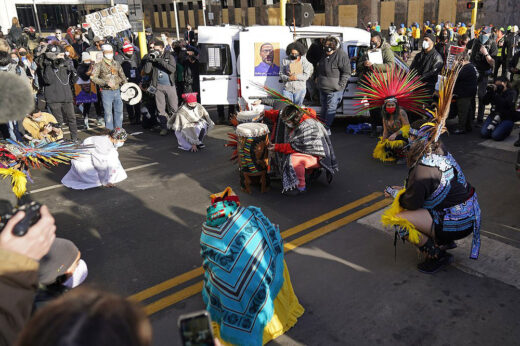
MINNEAPOLIS—Spirited, determined protesters greeted day one of The People vs. Derek Chauvin for the murder of George Floyd. “The world is watching” read the main banner behind which an estimated 1,000 people had gathered by 8 a.m., one hour before the trial formally opened.
A spokesperson for the National Alliance Against Racist and Political Repression (NAARPR) brought greetings of solidarity from its Chicago-based national office. The NAARPR has been organizing protests around the nation since George Floyd was murdered May 25, 2020.
“We in NAARPR send greetings of solidarity with the George Floyd family and the freedom fighters and people in Minneapolis who are fighting for justice and the conviction of the killer cop Derek Chauvin,” said the spokesman.
Johnathon McClellan of the Minnesota Justice Coalition talked about legislation introduced in the Minnesota legislature intended to curb police violence, empower civilian oversight, and limit the prerogatives law enforcement officers enjoy that shield them from prosecution. His organization has been providing legal and legislative support to the coalition of families victimized by police violence in Minnesota. He set out the aim of the movement coming together around justice for George Floyd.

“We are in a quest to obtain justice and equality, with Minnesota being the match that sparked this outpouring of consciousness. We are here to say no more. No more to policies that divide us based on diversity…no more to the boots on the necks of our children, our brothers, our sisters, our uncles, our fathers, our nieces, our friends, and our future.”
Hundreds of high school students joined the protesters armed with homemade signs. Helen, an African-American student at Washburn High in South Minneapolis, told People’s World, “Protesting today was a lot more important than heading to school. I think racism is not getting worse, it’s just getting recorded, so I think that it’s really important for everyone to show up right now.” Helen, along with three other friends, were heading home after four hours of protesting and marching.
Helen’s friend Jaela, a student a South High, said she came because “as Helen said, racism is just repeating itself. I just want to see a better future…I don’t want to have my kids and my grandchildren fighting when they get older. This should have been solved a long ass time ago. And, the fact that my grandma and other people in my family have had to go through things like this. I’m 17 and I am having to fight for myself still after hundreds of years’ oppression…it’s crazy that right now in this time that this is still an issue in our society.”
It was clear they were committed to returning to protest and to organizing more of their fellow students to join them.
The trial itself has been thrown into uncharted territory due to a legal debate and rulings about reinstating the third-degree murder charge against Chauvin. Last fall, the preceding trial judge, Hennepin County District Judge Peter Cahill, ruled that the third-degree charge did not fit the circumstances. Third-degree, he said, requires endangering more than one person in the execution of a crime. Since the case involved only one person, Floyd, the charge was not proper.
The state’s Attorney General’s office (AG), headed by former congressman Keith Ellison, appealed Cahill’s ruling to the appellate court. Due to several mitigating factors, the appellate court deemed the third-degree charge was applicable and Cahill must recognize this. The trial proceeded Monday knowing this question remained unresolved. Chauvin’s attorney, Erik Nelson, said the defense would take the issue to the Minnesota Supreme Court if the count is reinstated as ordered. To counter this possibility, the AG prosecutors filed a motion with the Minnesota Court of Appeals to delay the trial “until the district court regains full jurisdiction over the case.”
Despite this outstanding legal question, both sides agreed to continue to jury selection on Tuesday while they await some resolution on the third-degree charge. If it cannot be resolved, the trial may be postponed.










